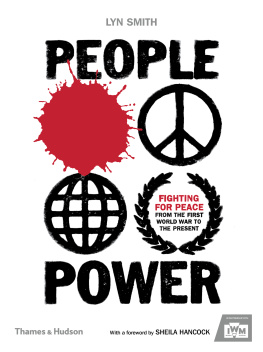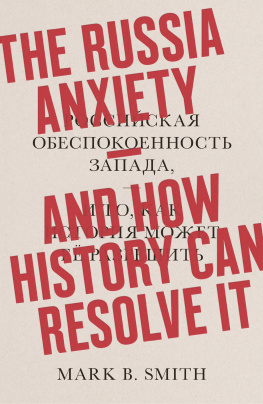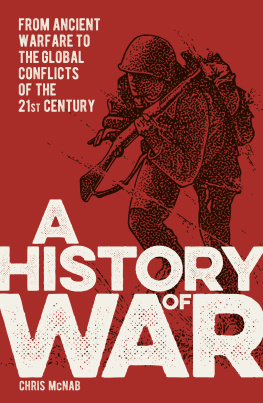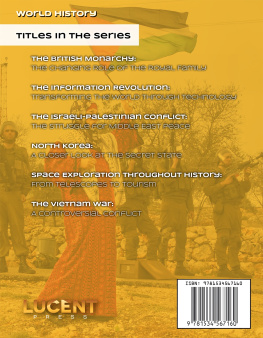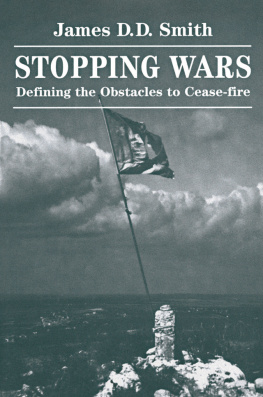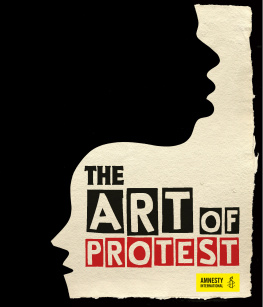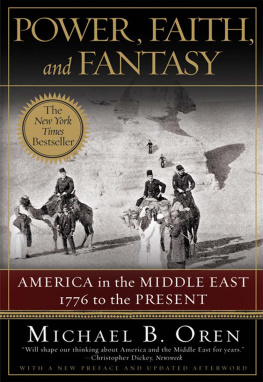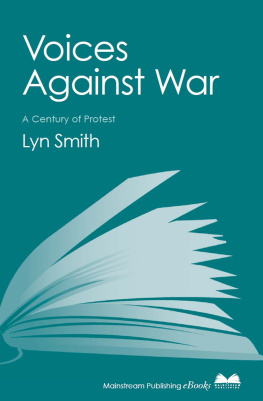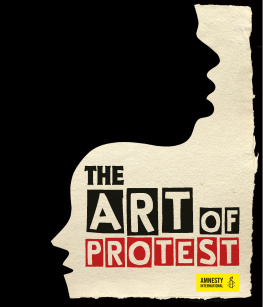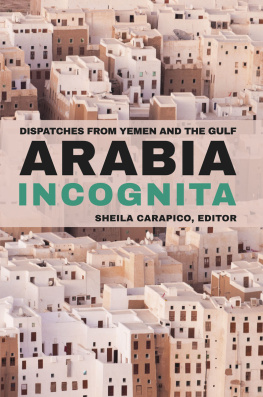
About the Author
Over the past thirty-five years Lyn Smith has lectured in International Relations and Human Rights at British and American universities, and has worked as a freelance interviewer for the Imperial War Museum. Her other books include Forgotten Voices of the Holocaust, Young Voices and Voices Against War.
Other titles of interest published by
Thames & Hudson include:
Mythomania: Tales of Our Times, From Apple to Isis
Earth-Shattering Events: Earthquakes, Nations and Civilization
The Battle for Home: The Memoir of a Syrian Architect
Mandate Days: British Lives in Palestine 1918-1948
www.thamesandhudson.com
www.thamesandhudsonusa.com
Published on the occasion of the exhibition People Power: Fighting for Peace at the Imperial War Museum, London
23 March28 August 2017
First published in the United Kingdom in 2017 as People Power: Fighting for Peace from the First World War to the Present
ISBN 978-0-500-51915-8
by Thames & Hudson Ltd, 181A High Holborn, London WC1V 7QX
and in the United States of America by
Thames & Hudson Inc., 500 Fifth Avenue, New York, New York 10110
Published in association with Imperial War Museums
www.iwm.org.uk
People Power: Fighting for Peace from the First World War to the Present 2017 The Trustees of the Imperial War Museum
This electronic version first published in 2017 by Thames & Hudson Ltd, 181A High Holborn, London WC1V 7QX
This electronic version first published in 2017 in the United States of America by Thames & Hudson Inc., 500 Fifth Avenue, New York, New York 10110
All Rights Reserved. No part of this publication may be reproduced or transmitted in any form or by any means, electronic or mechanical, including photocopy, recording or any other information storage and retrieval system, without prior permission in writing from the publisher.
eISBN 978-0-500-77393-2
eISBN for USA only 978-0-500-77394-9
To find out about all our publications, please visit
www.thamesandhudson.com
www.thamesandhudsonusa.com
CONTENTS
Sheila Hancock
As a Quaker, I aspire to be a pacifist. Along with Winston Churchill, I firmly believe that to jaw-jaw is always better than to war-war. But in the latest type of war, manifesting as terrorism, often carried out by random individuals who justify their savagery by claiming allegiance to a fanatical religion or cause, it is not clear how this belief in the power of persuasion can be effective. Had I chanced to be in Woolwich, with a gun in my pocket, in 2013 when Fusilier Lee Rigby was being hacked to death, would I have refrained from using it? I dont know. I only hope I would have had the courage of Ingrid Loyau-Kennett, who kept talking to the two killers, one with bloody hands holding a knife, until the police arrived, thereby possibly avoiding further carnage.
One answer to my dilemma, as for the conscientious objectors in the two world wars, would be not to have a gun in the first place. Which throws up the question of Britains involvement in the arms trade. In July 2016, the Unite union issued a statement that, though they firmly believe in beating swords into ploughshares, the union had to think first and foremost of the protection and advancement of its members interests at work, which included the renewal of Trident. One is sympathetic with their predicament, but would not the billions spent on this outdated weapon be better expended providing alternative work in the area, and, above all, waging an all-out war, through education and improved opportunities, on the radicalization that leads to our modern dangerous scourge of extremism? I am comforted that many protesters against the Trident programme in Scotland and England will continue their mission until, as with Greenham, the missiles are deemed irrelevant in our changed world.
My own efforts at peacemaking have been easy, in fact, rather enjoyable: the CND marches, demos, protest meetings in Trafalgar Square and visits to the women at Greenham, especially the glorious day when thousands of women embraced the base and pinned beautiful pictures and objects to the ugly wire. The march against the Iraq War in 2003 was a deeply felt protest by people from all backgrounds, but there was still room for humour, as revealed in the banners. I particularly liked: Notts County supporters say make love not war (and a home win against Bristol would be nice).
People power does seem to produce creativity. This book covers the years from 1914, but before that arch-pacifist Jesus was telling us all, including the Unite union, to turn our swords and spears into agricultural tools, Aristophanes was writing anti-war plays, and poets, novelists, artists and musicians have spoken to our souls of the horror of war for generations. I got myself into hot water with the press in 2014 by suggesting that the art installation of poppies in the moat of the Tower of London should be completed by being malevolently mown down by a tank, in the way that the servicemen and -women the poppies represented had been. I was worried the reaction to the art had become a beautiful veneration of war, rather than a reminder of the grotesque ugliness of the suffering.
Photographic images are particularly potent. Who can forget the Vietnamese child, her back burned by napalm, running away with her terrified friends in the Vietnam War? Or the tiny mite washed up dead on the shore of Lesbos in 2015? We find these things painful, so most of us put them out of our minds. I was struck in the Brexit debate by how little discussion there was about the origins of the concept of a united Europe. As a child of the war, bombed, evacuated, full of hatred of the Germans, at one time married to an airman involved in bombing Germany, who in their turn hated him, I rejoiced at the idea of uniting with our erstwhile enemies to build a better world. Flawed, yes, but in many ways a triumph. But there are few of us left to remember.
I had completely forgotten many of the conflicts in this book. I had forgotten how one was appalled at the time by the idiocy of the missiles at Greenham that lumbered clumsily round the countryside, easily stopped by a group of women lying in the mud, who could also get into the camp with some wire-cutters and dance on the silos containing the weapon. The sheer incompetence of the defence system was disturbing. I had forgotten the all-consuming terror in my youth of The Bomb, and the conviction that the much-prized balance of power, which justified the development of nuclear weapons, could easily be blown out of the water by a madman and God knows we had witnessed several of them during the war, and there are plenty still around now. We were told the destruction of lives and homes in Hiroshima and Nagasaki was to shorten the war. I was moved by the story in the book of the airman who commented, I think they may have saved our lives at the expense of our childrens.
This book reminded me of the massive scale of the slaughter and mayhem over the years and pushed me close to despair. But it also made me profoundly grateful to everyone who has tried to stop the devastation. Many felt the march against the war in Iraq in 2003 was a failure as we still went to war despite millions worldwide saying no. Sir John Chilcots Inquiry recognized that the UK chose to join the invasion before the peaceful options for disarmament had been exhausted. Military action at that time was not a last resort. It was a step in the right direction. Brian Haws ten-year vigil in Parliament Square, when he was subject to physical attack and ridicule, was not in vain. Thanks to people like him, gung-ho attitudes to war are changing. I pay homage to all the people in this book and beyond, who have pleaded and prayed for peace. E. M. Forster was a pacifist. Something he wrote in
Next page
